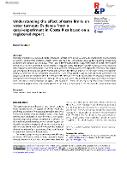Understanding the effect of term limits on voter turnout: Evidence from a quasi-experiment in Costa Rica based on a registered report

Publication date
2024Published in
Research & PoliticsVolume / Issue
11 (3)ISBN / ISSN
ISSN: 2053-1680ISBN / ISSN
eISSN: 2053-1680Metadata
Show full item recordCollections
This publication has a published version with DOI 10.1177/20531680241266899
Abstract
Imposing term limits on elected officials is expected to increase turnout due to enhanced competition by one theoretical perspective, while another predicts depressed turnout as a result of clientelist turnout buying. These puzzling contradictory predictions are examined by a quasi-experiment (using a difference-in-differences approach) based on a 2022 reform which introduced term limits for Costa Rican mayors that were applied for the first time in the 2024 municipal election. Over one half of mayors suddenly faced retroactive term limits, while the remaining ones were eligible for reelection. This analysis was pre-registered following the 2022 reform but before the 2024 election, that is, at a time when treatment assignment already occurred but the post-treatment outcomes were not known and the analysis could still not be performed. The analysis could only be completed after the February 2024 election. The results suggest that the adoption of term limits reinvigorated electoral competition but that its participatory gains were only modest, fostering turnout only in the largest cities. The analysis contributes by advancing the-still uncommon-practice of pre-registering observational research after the treatment assignment but prior to the release of the data (and even prior to the processes that produce that data).
Keywords
Voter turnout, term limits, Costa Rica
Permanent link
https://hdl.handle.net/20.500.14178/2728License
Full text of this result is licensed under: Creative Commons Uveďte původ 4.0 International






